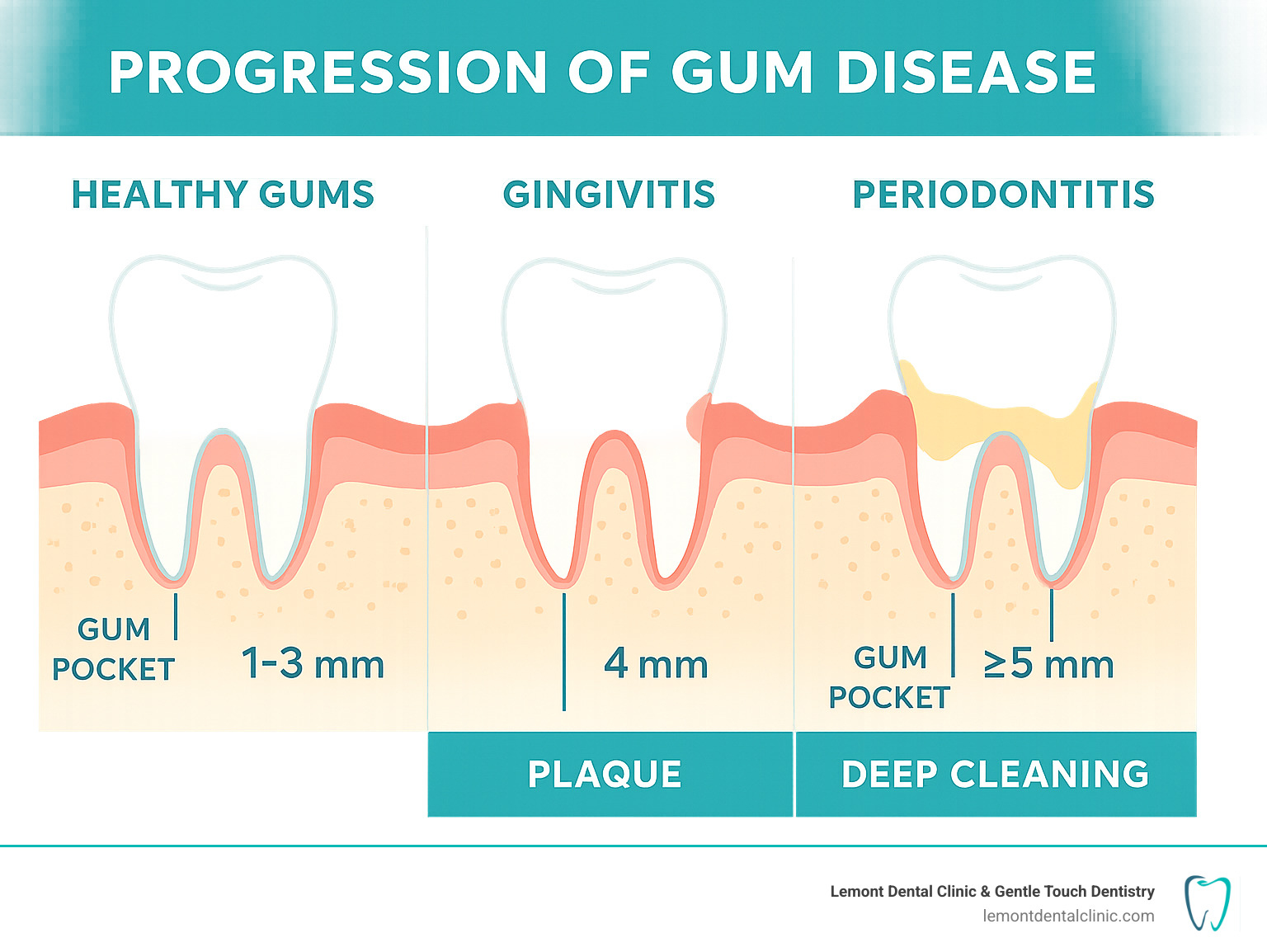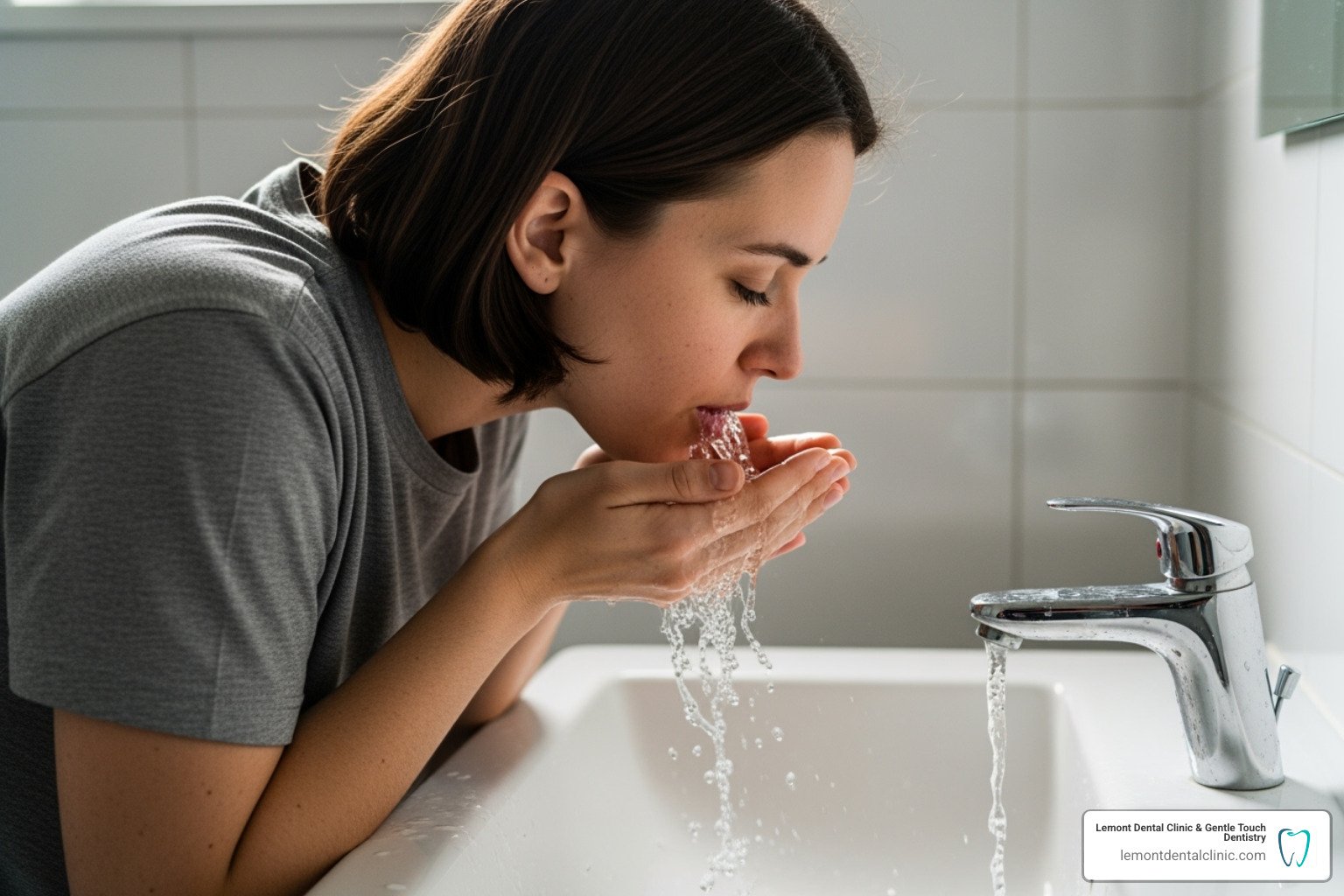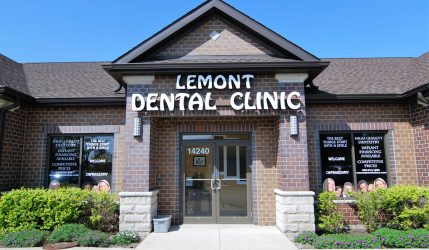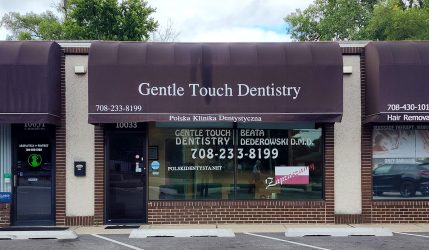The Truth About Deep Cleaning Pain: What Patients Really Experience
Does deep cleaning hurt? While you might experience some mild discomfort during a deep cleaning, the procedure itself is typically pain-free thanks to local anesthesia. Most patients feel only pressure and vibrations from the dental tools, not actual pain.
Quick Answer:
- During the procedure: Minimal to no pain with local anesthesia
- After the procedure: Mild soreness lasting 1-3 days
- Tooth sensitivity: May last up to one week
- Pain management: Over-the-counter pain relievers and salt water rinses are usually sufficient
The fear of pain often keeps people from getting the dental care they need. But here’s what our research shows: most soreness goes away within 1-3 days, and any sensitivity improves in about a week. The temporary discomfort is far outweighed by the long-term benefits of healthier gums and preventing serious complications like tooth loss.
A deep cleaning (also called scaling and root planing) targets plaque, tartar, and bacteria below your gum line – areas your regular toothbrush can’t reach. When gum disease causes pockets deeper than 5mm around your teeth, this specialized treatment becomes necessary to halt disease progression and save your teeth.
What makes patients anxious? The thought of dental tools working below the gum line sounds intimidating. But modern techniques, gentle approaches, and effective numbing make the experience far more comfortable than most people expect.
I’m Piotr Dederowski from Lemont Dental Clinic & Gentle Touch Dentistry, and I’ve helped countless anxious patients understand that the question “does deep cleaning hurt” has a reassuring answer. Through years of providing gentle dental care, I’ve seen how addressing patient concerns about deep cleaning pain helps people get the treatment they need for optimal oral health.

What is a Deep Cleaning and Why Might You Need One?
A deep dental cleaning—officially called periodontal scaling and root planing—is a treatment designed to give your gums a fresh start. Unlike a regular cleaning that focuses on tooth surfaces above the gum line, a deep cleaning goes below it. We target the plaque, tartar, and bacteria that have accumulated in the pockets between your gums and teeth.
These gum pockets form when gum disease causes your gums to pull away from your teeth. If left untreated, these pockets deepen, leading to bone loss and even tooth loss. A Deep Cleaning is crucial to stop this process, reduce inflammation, and help your gums heal and reattach to your teeth.

The Difference Between a Regular and a Deep Cleaning
Many patients wonder what sets these two procedures apart. The answer comes down to how deep we need to go and what we’re treating.
A Regular Cleaning is your twice-yearly tune-up for healthy mouths. It’s preventive care that keeps problems from starting. A deep cleaning, on the other hand, is therapeutic treatment for gum disease that’s already developed.
| Feature |
Regular Cleaning |
Deep Cleaning (Scaling and Root Planing) |
| Purpose |
Preventative care; remove plaque/tartar above gum line |
Treat gum disease; remove plaque/tartar below gum line |
| Procedure Depth |
Above the gum line; polishing tooth surfaces |
Below the gum line, down to tooth roots; smoothing roots |
| Anesthesia Use |
Rarely needed; minimal discomfort |
Typically uses local anesthesia to numb the area |
| Appointment Time |
Usually 30-60 minutes |
Often 90 minutes to 2 hours per session; multiple sessions |
| Frequency |
Every 6 months (for most healthy individuals) |
As needed to treat gum disease; followed by more frequent maintenance cleanings (e.g., every 3 months) |
The key difference? During a deep cleaning, we smooth out your tooth roots (that’s the “root planing” part). This removes bacterial toxins and creates a clean surface where your gums can heal and reattach.
Most patients need local anesthesia because we’re working in sensitive areas below the gum line. But here’s the reassuring part: the numbing makes the procedure comfortable, not painful.
Signs You Might Need a Deep Cleaning
Your mouth signals gum disease with several red flags. Bleeding gums when brushing or flossing are a primary warning sign. Other symptoms include swollen, tender, or red gums, persistent bad breath, receding gums that make teeth look longer, and in advanced cases, loose teeth.
Since gum disease can progress quietly, it’s crucial to address these signs early. At Lemont Dental Clinic & Gentle Touch Dentistry, we measure your gum pocket depths and may take X-rays to determine the best course of action. Early treatment is always simpler and more effective.
For more detailed information about how gum disease develops and progresses, check out our comprehensive guide: Periodontal Disease: The Sneaky Enemy of Teeth.
So, Does a Deep Cleaning Hurt? Unpacking the Procedure
The question, “does deep cleaning hurt?” is one of the most common concerns we hear. We’re here to reassure you that while you might feel some mild sensations, true pain during the procedure is very rare. Thanks to modern dental techniques and effective pain management, your comfort is our top priority.
A deep cleaning, also known as periodontal scaling and root planning, is a careful two-step process:
- Scaling: We gently remove all built-up plaque and tartar from both above and below your gum line using specialized ultrasonic and hand-held instruments.
- Root Planing: We carefully smooth the rough spots on your tooth roots. This removes bacterial toxins and makes it harder for new plaque to stick, encouraging your gums to heal and reattach firmly.
We always make sure the area is thoroughly numbed with a local anesthetic. This means you should feel minimal to no pain during the cleaning itself—mostly just gentle pressure or vibrations.

What to Expect During Your Appointment
We often perform deep cleanings over two or more appointments, focusing on one or two sections (quadrants) of your mouth at a time. This makes the experience more manageable. Each session typically lasts around 90 minutes, which includes time for numbing, the cleaning itself, and aftercare instructions. You won’t feel sharp pain, but it’s normal to feel pressure and vibrations from our instruments. Afterward, we may apply an antibacterial rinse or a localized antibiotic into deeper pockets to aid healing.
Does a deep cleaning hurt? Managing Discomfort During the Procedure
Your comfort is our priority. Here’s how we manage discomfort during a deep cleaning:
- Local Anesthetic: We thoroughly numb the treatment area with a local anesthetic, often preceded by a topical numbing gel. This ensures you feel only pressure or vibrations, not pain.
- Sedation Options: For anxious patients, we offer sedation options like nitrous oxide (“laughing gas”) or oral sedatives to help you relax. We’ll discuss the best choice for you during your consultation.
- Open Communication: Please let us know if you feel any discomfort during the procedure. We can always pause, adjust, or provide more anesthetic. Your feedback helps us ensure a stress-free experience.
After the Cleaning: Managing Recovery and Side Effects
After your deep cleaning, it’s normal for your gums to feel a bit sensitive as they heal. This is a positive sign that your mouth is adjusting to a healthier state. Common post-procedure sensations include gum tenderness or soreness, mild swelling, and tooth sensitivity to hot or cold temperatures. This sensitivity occurs because the tooth surfaces previously covered by tartar are now exposed. These feelings are temporary and a normal part of the recovery process. If you have pre-existing sensitivity, like from a condition discussed in Why Does My Tooth Hurt?, it might feel more pronounced at first.

How Long Does Discomfort Last?
The good news is that post-deep cleaning discomfort is usually short-lived. Most patients find that soreness and gum tenderness fade within 1 to 3 days.
Tooth sensitivity might last a little longer, often improving significantly within a week. For some, it might take a few weeks for all sensitivity to completely resolve as your mouth adapts to its new, cleaner environment.
While these symptoms are normal, please call Lemont Dental Clinic & Gentle Touch Dentistry if you experience severe pain not managed by over-the-counter medication, pain that worsens or lasts beyond 3 to 5 days, excessive bleeding or pus, or signs of infection like a fever. We’re here to guide you through your recovery.
Tips for a Smooth and Comfortable Recovery
To ensure a smooth recovery, follow these simple tips:
- Take over-the-counter pain relievers like ibuprofen for soreness.
- Rinse with warm salt water (half a teaspoon of salt in eight ounces of water) several times a day to reduce swelling and promote healing.
- Stick to a soft food diet for a day or two, avoiding hard, crunchy, or spicy foods.
- Brush gently with a soft-bristled toothbrush. We may advise you to avoid flossing the treated area for the first 24 hours.
- Use a desensitizing toothpaste if you experience sensitivity.
- Avoid smoking and tobacco products, as they hinder the healing process.
- Stay hydrated by drinking plenty of water to help keep your mouth clean.
The Long-Term Benefits vs. Potential Risks
When you’re wondering “does deep cleaning hurt,” it’s natural to focus on immediate discomfort. But the incredible long-term benefits make any temporary soreness completely worthwhile.
Think of a deep cleaning as hitting the reset button on your oral health. Without treatment, gum disease gets progressively worse, potentially leading to tooth loss. By removing harmful bacteria below your gum line, we give your gums a chance to heal. This means fresher breath, reduced bleeding, and healthier gums.
The benefits also extend to your overall well-being, as untreated gum disease has been linked to heart problems and diabetes complications. Treating your gums helps protect your entire body from chronic inflammation.
Regular Check-ups help us monitor your progress and catch any issues before they become serious problems again.
The Upside: Why It’s Worth It for Your Gum Health
The primary benefit of a deep cleaning is stopping disease progression. It halts the destruction of the bone that supports your teeth—bone that, once lost, does not grow back. Other key benefits include:
- Protecting tooth roots: Smoothing the roots makes it harder for plaque to stick, allowing gums to heal and reattach.
- Reducing inflammation: Swollen, tender gums become firm and healthy again as the infection is eliminated.
- Eliminating bad breath: Removing the underlying infection often resolves persistent halitosis.
- Improving overall health: Reducing oral bacteria and inflammation benefits your entire body, lowering the strain on your immune system.
Are There Any Risks or Downsides?
The main “risks” are the temporary discomforts we’ve already discussed—gum tenderness and tooth sensitivity that typically resolve within a week. These are normal parts of the healing process, not true complications.
Some patients notice gum recession after treatment. This happens because the inflammation that caused swelling goes down, and your gums return to their true, healthier position. This might make teeth look slightly longer, but it’s a sign of proper healing.
For patients with compromised immune systems, there’s a very small risk of bacteria entering the bloodstream, which we manage with appropriate precautions.
Temporary sensitivity occurs because tooth roots previously covered by tartar are now exposed. This usually improves as your gums heal.
The reality is that when performed by experienced professionals like our team at Lemont Dental Clinic & Gentle Touch Dentistry, serious risks are extremely rare. The much greater risk comes from not treating gum disease, which can lead to irreversible bone loss and tooth loss.
Frequently Asked Questions About Deep Cleaning
Here are answers to the most common questions we receive about deep cleanings.
How long does a deep cleaning take and how often is it needed?
A deep cleaning is typically spread across one or two appointments, with each session lasting about 90 minutes to 2 hours. For more advanced cases, up to four visits may be needed. Splitting the treatment into sessions makes it more comfortable and allows for more effective numbing.
After the initial treatment, you will need more frequent periodontal maintenance visits, usually every 3 months, to ensure your gums stay healthy. Depending on your healing and home care, you may eventually return to a six-month schedule.
Is a deep cleaning covered by dental insurance?
Yes, most dental insurance plans do cover a significant portion of deep cleanings (scaling and root planing) as it is a medically necessary treatment for gum disease. Coverage typically ranges around 80%, but this varies by provider and plan. It’s always best to check your specific benefits, including any waiting periods or annual maximums.
Our team at Lemont Dental Clinic & Gentle Touch Dentistry is happy to help you verify your coverage to provide a clear estimate of any out-of-pocket costs, ensuring there are no surprises.
When should I consider sedation for a deep cleaning?
Sedation can make a deep cleaning a much more comfortable experience for certain patients. You should consider it if you have:
- Severe dental anxiety
- A low pain tolerance
- Anxiety about the sounds or length of the appointment
- A need for extensive treatment over long sessions
We offer options like nitrous oxide (laughing gas) for gentle, temporary relaxation, and oral sedatives for deeper calmness. We will discuss your comfort level and concerns during your consultation to determine if sedation is the right choice for you. Our goal is to ensure you have a positive, stress-free experience.
Conclusion: A Healthier Smile is Worth It
We hope this comprehensive guide has answered your main question: does deep cleaning hurt? The truth is, while you might experience some temporary discomfort during recovery, the procedure itself is typically pain-free thanks to modern anesthesia techniques. More importantly, any mild soreness that lasts a few days is nothing compared to the life-changing benefits of stopping gum disease in its tracks.
Think of it this way – would you rather deal with a few days of tenderness now, or face the possibility of losing your teeth later? When you choose to get a deep cleaning when it’s recommended, you’re making a smart investment in your future. You’re halting gum disease progression, preventing tooth loss, and giving yourself the gift of fresher breath and healthier gums. Many patients are amazed at how much better their mouth feels once the infection is gone and their gums start healing.
The connection between your mouth and the rest of your body is real and significant. By taking care of your gums, you’re also taking care of your overall health. Research continues to show links between untreated gum disease and serious conditions like heart disease and diabetes.
At Lemont Dental Clinic & Gentle Touch Dentistry, we understand that dental anxiety is real, and we never dismiss your concerns. Our experienced team uses the gentlest techniques and most effective pain management to ensure your comfort throughout the entire process. We’re proud to serve the Lemont and Palos Hills communities with comprehensive care that combines the latest technology with competitive pricing – because quality dental care should be accessible.
Don’t let fear hold you back from the healthy smile you deserve. The temporary discomfort is truly minimal compared to the long-term benefits you’ll enjoy. Take that important next step by scheduling your Regular Cleaning and consultation with us today. As Your Trusted Lemont Dentist, we’re here to guide you through every step of your dental journey with care and expertise.
Your healthier, more confident smile is waiting – and we’re excited to help you achieve it!










